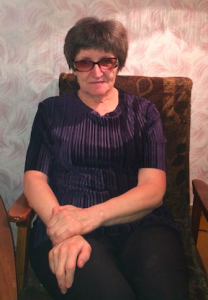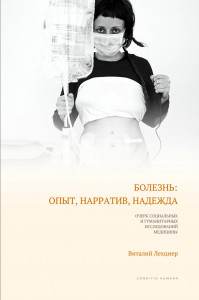© 2018 Elena Kirilenko
2018 — №1 (15)
 Key words: Vitaly Lekhtsier, medicine, illness/disease, patient, experience, narrative, hope.
Key words: Vitaly Lekhtsier, medicine, illness/disease, patient, experience, narrative, hope.
Abstract: Analysis of medicine suggested by Vitaly Lekhtsier combines positions of a philosopher, a sociologist, an epistemologist, a culture studies specialist, a historiographer, and a medical anthropologist. We may argue that the present study is a new step in contemporary humanitarian studies of medicine. It sums up the development of modern humanitarian reflection of the last decades in Russia and abroad.
 [Review on Vitaly Lekhtsier (2018) Disease: Experience, Narrative, Hope. An Essay in Social and Humanitarian Studies of Medicine, Vilnius: Logvino literatūros namai. / Лехциер В.Л. (2018) Болезнь: опыт, нарратив, надежда. Очерк социальных и гуманитарных исследований медицины. Вильнюс: Logvino literatūros namai.]
[Review on Vitaly Lekhtsier (2018) Disease: Experience, Narrative, Hope. An Essay in Social and Humanitarian Studies of Medicine, Vilnius: Logvino literatūros namai. / Лехциер В.Л. (2018) Болезнь: опыт, нарратив, надежда. Очерк социальных и гуманитарных исследований медицины. Вильнюс: Logvino literatūros namai.]
The general concept of this work is an idea of Hope, an ethos of humanism, steadfastness, and meaningfulness. It is a talk about medicine in the light of realizing the serious problems experienced by its scientific branch. Before the readers’ eyes a dialogue is unfolding: a dialogue between the doctor and the patient, voice of medicine and voice of the lifeworld (p. 135), medicine of modernism and postmodernism, humanitarian discourse and the views of modern medical technologists and futurists, the world of medical theory and sociological and medico-anthropological empiricism (reconstructing research positions, e.g. that of Cheryl Mattingly), fine philosophy and practical recommendations (i.e. a note on importance of literary pathographies for professional development of medical students, p. 137).
The idea of the dialogue is relevant both methodologically and sociologically. The author rightly underlines that professional isolation of the medical community does not lead to the rise of the quality of medical care, but is geared towards priority of professional survival (p. 144).
Analysis of medicine suggested by Vitaly Lekhtsier combines positions of a philosopher, a sociologist, an epistemologist, a culture studies specialist, a historiographer, and a medical anthropologist.
One of the most striking chapters in this sense is the reconstruction of the distinctions of patient narratives in A. Frank’s interpretation, the precise and meaningful analysis of patient storytelling, accompanied by a subtle phenomenological study of bodily life. This is a brilliant example of a vivid and substantial philosophical expansion into the sphere of analysis of medical phenomena.
The research opens up possibilities of cultural analysis of medical phenomena (the author speaks of “soft cultural studies” avoiding vulgar dispositions in analyzing the content of consciousness, p.164). The paragraph “Narrative medicine in the focus of empirical sociological research (the Russian context)” is a vivid illustration of the possibilities of sociological analysis of medicine. The polyphony of discourses in the work creates a special atmosphere of musicality, provoking feedback and new thoughts among readers. The multiplicity of themes generates multiplying overtones. The author reveals unexpected medical and legal parallels: a comparison of legal and ethical-medical evidence (p. 159). The author, being a sensitive and professional researcher, can hear these two loud discourses of our time.
The work provides a profound and powerful insight into the Western culture of philosophical, sociological, psychological thought, medico-anthropological, primarily the North American tradition, embracing the experience of outstanding researchers who proposed and enriched the line of thinking about medicine with the concepts of ‘society of remission’, ‘illness / disease’ distinction, ‘Mediziner / Arzt’, ‘ethics of care’, ‘narrative medicine’.
We may argue that the present study is a new step in contemporary humanitarian studies of medicine. It sums up the development of modern humanitarian reflection of the last decades in Russia and abroad. The key research focus (subjective aspects of medical experience of the doctor and the patient; ‘humanitarian pain management’) brings to the fore axiological problems.
A new ethic, an ethic of trust that assumes “sincere dialogue” (P.152), opens the way for a return to the Ethics. Bioethics, like other professional ethics, is normative regulation that provides for a set of appropriate sanctions (N. Novikova).
Summarizing what has been said one could note: the humanitarian discourse on medicine presented in the work shines with bright ideas and original constructions. The work is endlessly meaningful, dynamic in style, written in an inspired, vivid, convincing manner, the thought develops rapidly. We follow it, the thought that opens up entirely new fruitful, inspiring horizons.